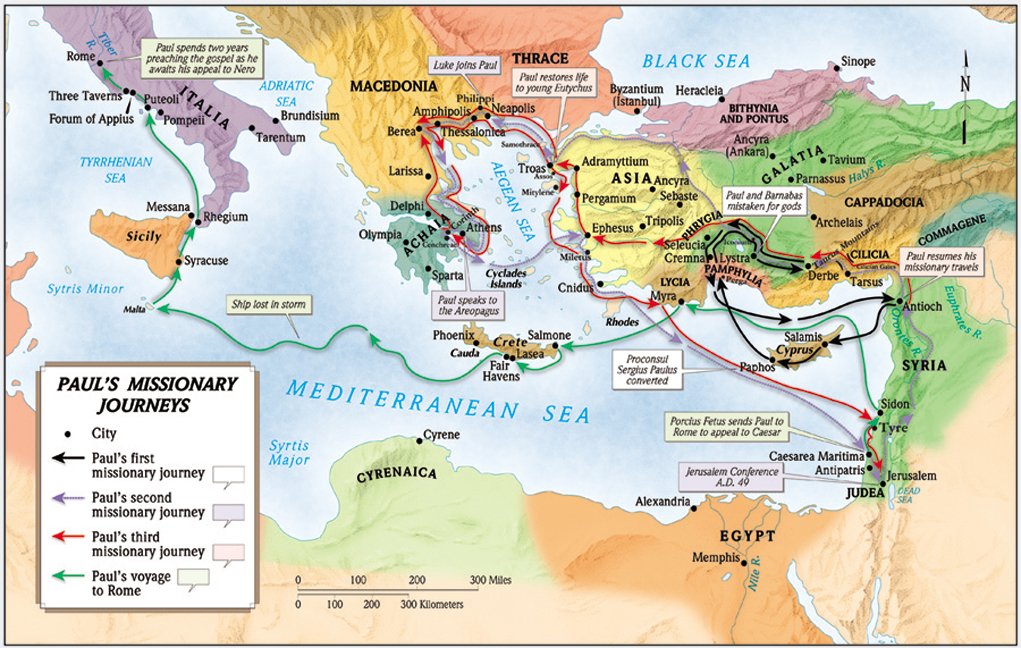Blog
Bulletin Articles
The Work of the False Teacher
Wednesday, December 08, 2021
In an epistle that contains a number of negative descriptions, Romans 16:17-18 is the last. Here, though, Paul is not concerned with degenerate Gentiles or hard-hearted Jews. Instead, he focuses on troublemakers within the Christian community. They have the following four characteristics:
They Create Division. Disciples of Christ are supposed to be peacemakers like their Master. Some Christians, though, seek out division instead. They prefer quarreling to bearing with, and they savor the feeling of angry self-righteousness that comes from being “right” when other brethren are “wrong”. We must watch out for those who enjoy conflict in the church, and we must beware of becoming such ourselves.
They Impose Obstacles. As all of us know, it isn’t easy to follow the commandments of the Lord. The path of righteousness is narrow. However, there are those who think it isn’t narrow enough. Pharisee-like, they bind heavy burdens on others that the word does not, and they reject those who do not agree with them. There is an appearance of holiness to this rigor, but it isn’t truly holy. We must be faithful to the Scriptures in what we condemn as well as in what we approve.
They Serve Their Own Appetites. Christ is to be master over us, but the devil constantly strives for dominance in every heart, especially the hearts of teachers of the word. He employs the familiar tools of 1 John 2:16, the lust of the flesh, the lust of the eyes, and the pride of life. The lust of the flesh and the lust of the eye are obviously problematic, but it’s harder to spot ministers who are motivated by pride.
Perhaps the best way to determine whether pride is an issue in a man’s heart is to analyze his behavior according to the previous verse and Jesus’ dictum about knowing a tree by its fruits. Does he look to cause division instead of making peace? Does he put obstacles in the way of those who seek Christ? If so, pride is the likely culprit.
They Deceive with Smooth Words. It is worth noting that Paul says that the unsuspecting are the prey of the false teacher. It is much easier to fool the ignorant and trusting than the knowledgeable and wary.
Thus, we always must be on our guard against those who would deceive us in spiritual matters. This begins with a Berean attitude toward everything we hear. Even if the speaker is our favorite preacher or an angel from heaven, don’t take his word for it!
Second, we must beware of appeals to extrabiblical information. There is much to be gained from the study of linguistic and historical resources, but the Bibles we hold in our hands are all any of us need to inherit eternal life. When somebody starts telling us that we don’t understand a verse right because the Greek actually means this, or because scholars have determined that thus and such was true in Ephesus 2000 years ago, we should become very suspicious. Their goal is for us to put our faith in the expert instead of the word. Bible helps and Bible scholars have their place, but that place is not to trump the plain meaning of the text.
Putting on the Lord Jesus Christ
Thursday, December 02, 2021
As we have been working our way through Romans on Sunday evenings and in our daily readings, hopefully the extraordinary quality of the epistle has become obvious. Romans has changed the course of human history, and with good reason. The substance of Paul’s argument is astonishing in its scope, and the skill with which he argues is no less impressive. He pulls out all the stops in presenting his case as persuasively as possible.
Some of the devices he employs are obvious, but others are quite subtle. Consider, for instance, the lead-in to the discussion of conscience in Romans 14. In that chapter, Paul urges the Christians in Rome not to judge or have contempt for brothers who differ in conscience.
Much of the preface in Romans 13 is straightforward. 13:8-10 tells us to love one another. 13:11-12 calls us to put on the armor of light because of the brevity of human existence. 13:14 exhorts us to put on Christ and make no provision for the flesh.
All of this is good sound preaching, as the saying goes. We like to be told things like this. Sermons using these Scriptures inspire us and have us walking out of the church building humming “Onward, Christian Soldiers” to ourselves. It doesn’t seem to have much to do with walking wide around the conscience of others, though.
The trap is in 13:13. There, Paul supplies us with a list of three pairs that are part of the works of darkness, the works in which we are not supposed to walk. The first two pairs are more of the same. We are not to walk in orgies and drunkenness. Sounds like a good idea to me! Likewise, we are not to walk in sexual immorality and sensuality. This may step on the toes of some Christians, but it probably doesn’t for most who are in the auditorium Sunday morning.
The third pair, though, is “not in quarreling and jealousy”. All of a sudden, “Onward, Christian Soldiers” kind of skips a beat, doesn’t it? Jealousy. Hmm. It’s awfully easy to find ourselves enviously regarding someone else’s attractiveness, prosperity, or position. Or good health, for that matter.
Quarreling is even worse. Brethren have been known to quarrel these days, sometimes, just a little bit. Perhaps we ourselves have exchanged a heated word or two with another Christian about. . . COVID, just to pick an example out of the air. Perhaps we have formed into factions with other like-minded brethren so that we can complain to them about the ungodly behavior of the other side. Perhaps we have Vaguebooked about how ungodly they are. Perhaps we have disturbed the peace of our congregation or even caused a church split.
The Holy Spirit says that’s walking in darkness. The Holy Spirit says that’s making provision for the flesh and its lusts. In fact, the Holy Spirit says that’s on the same level as participating in an orgy.
If that’s where we find ourselves, we need to put some onward in our Christian soldiers. We need to rush into battle, not against those who disagree with us, but against the devil who has entrenched his self-righteousness, judgmentalism, and contempt in our hearts. Our sin may be sweet in the mouth, but it will be bitter in the stomach.
How can we win this desperate fight? Paul is so glad you asked.
Welcome to Romans 14.
Paul's Plans, God's Will
Tuesday, November 30, 2021
Romans is one of the easiest books to place in the chronology of the New Testament. Paul wrote it during the three months of Acts 20:3, which happened sometime between 55 and 56 AD. We can locate it so precisely because of Paul’s autobiographical commentary in Romans 15:22-32. He has finished collecting the contribution for the needy saints in Macedonia and Greece, and he is about to take it to Jerusalem.
However, there is more than a touch of pathos to Paul’s description of his plans after that. He hopes to leave Jerusalem, travel to Rome, meet the Roman brethren for the first time, and ultimately embark on the first-ever preaching tour of Spain. Throughout his ministry, he prefers to go where others haven’t.
To say the least, things don’t go according to plan. While in Jerusalem, he is nearly lynched by a mob in the temple. He is arrested by the Romans as a troublemaker and is spirited out of Jerusalem before a band of Jewish assassins can kill him. He appears before the Roman governor and is imprisoned for the next two years without a trial.
Another Roman governor appears. When Paul is brought before him, the apostle is forced to appeal to the emperor to keep from being remanded into the custody of the Jewish chief priests, who certainly will execute him. He is put on a ship to Rome, shipwrecked, and rescued. Eventually, he arrives at his destination, years after he had intended to come and a prisoner to boot. So far as we know, Paul never made it to Spain.
At first glance, these events appear to be much more the work of Satan than the work of God. However, we also must reckon with the other things that happened while he was enduring frustration, misery, and danger. For one thing, the prophecy of Acts 9:15 is fulfilled. Paul proclaims the gospel to the Jewish high council, two Roman proconsuls, and the puppet king Agrippa. Throughout his trials, he glorifies Christ.
Perhaps the most important consequence of Paul’s travails, though, is an indirect one. Among his companions on the journey to Jerusalem is the physician Luke, who joins him at Philippi. Luke goes with him to Jerusalem, then, two years later, from Jerusalem to Rome.
The Scriptures do not say what Luke did during those two years, but we can make some inferences. In Luke 1:1-4, Luke claims to have constructed his account after hearing from eyewitnesses and closely investigating things for himself. He was a Gentile from the Aegean, and so far as we know, the only time in his life that he would have been around people like the Twelve was during Paul’s imprisonment. It may well be that without that imprisonment, the foremost historian of our faith would not have been able to do his work.
Today, our plans often don’t go according to plan. When we face trial and suffering, we often wonder what God is doing with us, especially when we are prevented from serving Him in the way we wanted to. At such times, we should remember Paul. God’s plans for us are better than our plans for ourselves, and it may be that the most important thing about our suffering is the impact it has on someone else. We don’t know, any more than Paul did. All we can do is trust.
The Recurring Remnant
Monday, November 15, 2021
In Romans 9-11, Paul is concerned with what I like to call the problem of Israel. If salvation through Jesus is the triumphant conclusion of God’s plan for His people, how come the earthly nation of Israel, which had been God’s people for 1500 years, largely rejected it?
One of Paul’s answers to this conundrum appears in Romans 10:1-5. There, Paul notes that the failure of Israel to accept Christ is not as complete as it might seem. In the time of Ahab, the prophet Elijah thought he was alone, but there were 7000 others who were faithful to God. So too, Paul observes that there is a righteous remnant of Jews who did believe the gospel.
Though Paul doesn’t expand on his point, the righteous remnant is a theme throughout the Bible. Starting from the time when God first chooses a people to be His own, they show a dismaying fondness for apostasy. Eventually, God is forced to judge them, a tiny, faithful minority survives the judgment, they grow and prosper and become strong, and the cycle repeats itself.
This pattern begins even before the Israelites enter the land. 600,000 men saw God reveal Himself in fire at the top of Sinai and pledged themselves to Him. Of those thousands, only two remained faithful and crossed the Jordan into Canaan.
Once they are in the land, the problems continue. By the end of the time of the judges, Israel has been overrun by the Philistines and God’s dwelling place at Shiloh has been destroyed. The Israelites really don’t recover until the kingship of David.
The era of the divided kingdom sees more of the same. Though the house of Ahab and the worshipers of Baal seem so powerful in the time of Elijah, they are destroyed by Hazael, Elisha, and Jehu. Only the righteous remnant (comprising people like the Rechabites) endures. According to 2 Chronicles 30:11, another righteous remnant from the northern tribes comes humbly to worship in Jerusalem at the time of the destruction of the kingdom of Israel by the Assyrians.
The Assyrians are an instrument of judgment against the kingdom of Judah too. The remnant of Isaiah 10:20-21 is contextually a remnant that returns from Assyrian oppression, and it is made up of both Israelites and Judahites. As the Jeremiah 24 prophecy of good figs and bad figs makes clear, the same pattern holds during the Babylonian invasion and captivity.
There is a powerful lesson here for us. We want the Lord’s church to be thriving and strong, and we are grieved when we see so many brethren abandon the ancient pattern for the wisdom of the age. However, there never has been a time when God’s people were thriving and strong yet remained faithful. The divisions that have taken place since the Restoration only confirm the rule. Sadly, whenever the righteous prosper, they start trusting in themselves and cease to be righteous.
We should not yearn to belong to those who have got it all figured out and succeed through their own wisdom and strength. We should yearn instead to belong to the remnant, those who cling to God and are roundly mocked for doing so, always failing, always dwindling, always defeated.
Strangely enough, though it always looks like the remnant is about to be destroyed, it never is. Against the odds, God’s people endured through disaster in the wilderness, captivity in Babylon, and persecution across the Mediterranean. Indeed, they triumphed. No matter how bad things look, if we endure, we will triumph too, not because the remnant is so powerful, but because He is.
Calvinism in Romans 9
Friday, November 12, 2021
If there is any passage in the Bible that Calvinists love, it is Romans 9:6-24. Upon a casual reading it seems to confirm the Calvinist doctrine of predestination. It talks at great length about God’s mercy and God’s choice being the deciding factors in human existence, and in the context, Paul cites a number of Old-Testament figures to prove his point. When first I began to study the Bible on my own, this context intimidated me.
However, as is often the case, when we consider this text in a wider context, it takes on a different meaning. Paul’s goal in Romans 9-11 is not to explain the salvation or damnation of individuals; it is to explain why the physical nation of Israel, despite having received God’s promises, largely has rejected Jesus and His salvation. Romans 10:6 implies the question Paul is answering: has the word of God failed?
In response, Paul argues that the promises to the patriarchs are not fulfilled through their fleshly descendants (the physical Israel) but through the children of the promise (Christians). It always has been this way; according to the flesh, Ishmael and Esau should have been the heirs of the promise, but God chose Isaac and Jacob as heirs.
In this, Paul continues, God is not being unjust. If He wants to show mercy to Christians instead of Israelites, He has the right to do that, and if He wants to use Israel as a tool to make known His glorified people from all races, He can do that too.
None of this has anything to do with the predestination or salvation of individuals. Ishmael was not automatically lost because he was not the heir of the promise; in fact, we know nothing about his salvation or condemnation. The same is true of Esau. In many ways, he looks like a more righteous man than his younger brother.
The issue of Pharaoh is trickier. As Paul’s quotation from Exodus 9:16 shows, God did indeed raise Pharaoh up so that He would be glorified through him. However, at least for a time, Pharaoh had a choice about how God would be glorified. Cyrus-like (compare Isaiah 45:1-6), Pharaoh could have let God’s people go immediately, which would have made the book of Exodus much shorter and less interesting.
However, that’s not the choice that Pharaoh made. Though God did harden Pharaoh’s heart later (in much the same way that I might harden my wife’s heart by doing something that I know drives her buggo), the first time that Pharaoh’s hard heart is attributed to anybody, it’s attributed to Pharaoh, in Exodus 8:15. Now, God only could be glorified through Pharaoh’s humbling and destruction.
All of these Old-Testament characters are introduced, though, only to prove Paul’s main point. God can do whatever He wants with the physical nation of Israel, and He can do whatever He wants with the spiritual nation of Christians. Only the second nation will be saved, but as Paul’s own example proves, there was nothing hindering Jews from joining the spiritual Israel except for their own hardheartedness.
The same holds true for us today. We know which group will be saved. Whether we belong to that group is up to us.


